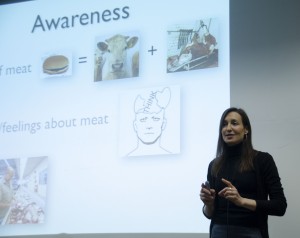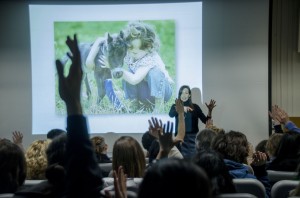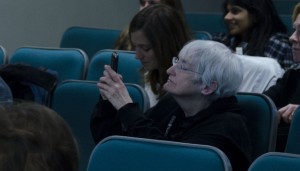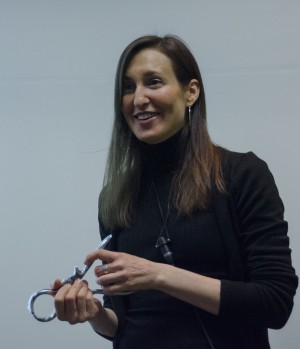
Ten billion land animals are slaughtered in the United States every year. That’s approximately twenty-seven million animals killed every day, more than a million every hour, and about three hundred every second. In the five minutes it took me to sit down and write this first paragraph, almost one hundred thousand animals were butchered, and all were paid for by us, the American people, consumers and taxpayers.
The vast majority of these animals are what we call “farm animals”: chickens, turkeys, pigs, and cows. This past Friday evening Dr. Melanie Joy, author of the critically acclaimed book Why We Love Dogs, Eat Pigs, and Wear Cows, spoke before a small but rapt audience here at BU about the cognitive gap in the way we treat different species of animals, species that are actually remarkably similar to one another.
Dr. Joy began her presentation with a comparison between cows and dogs, suggesting that a dish of spaghetti and meatballs would look quite different to the average viewer after being told the meatballs are from thigh of Golden Retriever, rather than breast of chicken or round of beef. But this revelation is intended to educate, rather than shock. “My goal is not to turn people vegan,” Dr. Joy told me shortly before her presentation. “You can’t force people to change. My goal is to raise awareness. Without awareness, there’s no free choice.”
The presentation is formed around the concept of “carnism,” a term coined by Dr. Joy to define the ideology or belief system common in America and other countries that it’s ethical to consume certain animals. Her speech brings awareness to the dissonance between how we treat pets versus livestock. Why are we disgusted by the idea of eating some animals, but not others? And why don’t we ask why?

The problem, she says, is that we simply don’t make the connection. We see dismembered animals everywhere we go — grocery stores, retail stores, restaurants — but rarely do we see the animals while still alive. Livestock in the United States outnumber humans by a ratio of 32 to 1, but we never see them: 99% of farm animals are now kept in CAFOs, or Concentrated Animal Feeding Operations, rather than the idyllic family farms pictured on milk cartons, and undercover videos, one of the only resources for glimpses into these dangerous facilities, are now threatened by new Ag-Gag laws.
Carnism has an additional, paradoxical problem: people care. “They’re compassionate, thoughtful people,” Gunita Kaur Singh, member of the BU Veg Society, said in reference to the nonvegan, or “carnist,” friends she brought to the event. More people love animals than don’t, and our compassion makes it hard for us to face the truth. Carnism requires us to walk through life with blinders: with the living, breathing, feeling animals hidden from sight, we don’t question the status quo.
Dr. Joy herself struggled with carnism for the first half of her life. “I always knew, on some level, that eating animals was antithetical to my personal values,” she said. But the shift in consciousness that allowed her to see the same world differently occurred after she woke up in the hospital with a food-borne illness contracted from eating a hamburger, solidly removing her appetite for meat. This turning point in her life allowed her to pursue the psychological aspect of carnism, exploring what it was that caused people to turn off their morals in very specific circumstances. “Choices always stem from belief,” she asserted, but issues arise when people’s beliefs are manipulated by societal norms.

“I’d always wondered why people have no problem with eating cows, but not dogs,” said Kimberly Salloum, Sargent College ’15, a nonvegan friend of Singh. “It’s important for people to be educated.” Her thoughts are echoed by Janis McQuarrie, the mother of a BU alumnus, who turned to veganism after her son died five years ago. She mentioned identifying as a mother as part of what led to her transition to give up eggs and dairy. “Doesn’t it start with not causing the violence?” she asked me.
The event was attended by vegans and nonvegans alike, and while all the vegans I spoke to agreed that education was the best path to change, a few are slightly less enduring than Singh, who said she tries to be “sympathetic and patient” with her carnist friends. Northeastern student Kaytee Doerner cited her reason for attending the presentation as looking for a way to articulate her position in a less aggressive manner, and BU student Yiorgos Christakis, CAS ’15, had trouble hiding his frustration after Dr. Joy’s speech. “It reinforced my position, especially the video,” he said, referring to the four minutes of slaughterhouse footage screened during the event. “My jaw hurts from being clenched. I think I’ll go home and smash bottles.”

The nonvegans were more optimistic. “I really enjoyed it,” said Nadeem Istfan, CAS ’14. “It’s important to understand this gap.” While he maintained that it would be too difficult to change overnight, he aspires to migrate towards veganism in the future, particularly when he moves off campus and has his own kitchen. “We should take advantage of free choice,” he stated.
It’s people like Istfan who make these events worthwhile. “Even if they do one thing differently, that’s huge,” said Tori Brown, the BU Veg Society member who organized the event. Change is slow, but change is happening: the number of vegans in the United States has doubled in recent years, and education is key in that transition. Advocates like Dr. Joy are offering a choice to people who never even realized they had one. “My goal is to help people recognize that eating animals is not simply a matter of personal ethics,” Dr. Joy affirmed. “It is the inevitable end result of a deeply entrenched oppressive system. Eating animals is a social justice issue.”


thank YOU for publishing this!